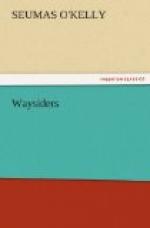When he came down from the hill there was a spring in Martin Cosgrave’s step. He swung his arms. The blood was coursing fast through his veins. His eyes were glowing. He would need to make a map of the building. It was all burned clearly into his brain.
From under the bed of his cabin he pulled out the wooden box. It had not been opened since he had fetched it from the far town. He held his breath as he threw open the lid. There they lay, the half-forgotten symbols of his old life. Worn mallets, chisels, the head of a broken hod with the plaster still caked into it, a short broad shovel for mixing mortar, a trowel, a spirit level, a plumb, all wrapped loosely in a worn leather apron. He took the mallets in his hand and turned them about with the quick little jerks that came so naturally to him. Strength for the work had come into his arms. All the old ambitions which he thought had been stifled with his early manhood sprang to life again.
As he lay in his bed that night Martin Cosgrave felt himself turning over and over again the words in the letter which Rose Dempsey had sent to her aunt, Ellen Miscal, from America. “Tell Martin Cosgrave,” the letter read, “that I will be back home in Kilbeg by the end of the spring. If he has no wish for any other girl I am willing to settle down.” Beyond the announcement that her sister Sheela would be with her for a holiday, the letter “brought no other account.” But what an account it had brought to Martin Cosgrave! The fields understood—the building would proclaim.
Early in the morning Martin Cosgrave went down to Ellen Miscal to tell her what to put in the letter that was going back to Rose Dempsey in America. Martin Cosgrave walked heavily into the house and stood with his back against the dresser. He turned the soft black hat about in his hands nervously and talked like one who was speaking sacred words.
“Tell her,” he said, “that Martin Cosgrave had no thought for any other person beyond herself. Tell her to be coming back to Kilbeg. Tell her not to come until the late harvest.”
Ellen Miscal, who sat over the sheet of writing paper on the table, looked up quickly as he spoke the words. As she did so she was conscious of the new animation that vivified the idealistic face of Martin Cosgrave. But he did not give her time to question him.
“I have my own reasons for asking her to wait until the harvest,” he said, with some irritation.
He stayed at the dresser until Ellen Miscal had written the letter. He carried it down to the village and posted it with his own hand, and he went and came as gravely as if he had been taking part in some solemn ritual.




